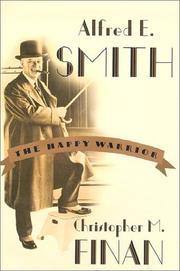Check nearby libraries
Buy this book

"Alfred E. Smith lost the 1928 presidential election by a landslide. Herbert Hoover and the Republicans sailed into office on a wave of prosperity, the promise of a chicken in every pot, and the support of the Ku Klux Klan.
In retrospect, it may seem that the brash Catholic anti-prohibitionist from New York's Lower East Side never stood a chance, but at the time, millions of Catholics and Jews rallied behind the "Happy Warrior" in the belief that he was going to shatter the unwritten law that only a Protestant could be elected president.".
"The meteoric rise and dramatic fall of Al Smith may be well known - from his job at the Fulton Fish Market, through his years in the state legislature and as four-time governor of New York, to his crushing defeat in 1928 and his final, puzzling defection from the Democratic Party in 1936 - but Christopher M. Finan's biography offers insights into Smith's early years in New York politics that change our perspective.
He provides an interpretation of Smith's break with Franklin Roosevelt, his successor as governor and someone he considered a close friend: Finan believes the split was more FDR's doing than Smith's, arguing that Roosevelt captured the Democratic nomination in 1932 by actively seeking the support of Smith's enemies, including the anti-Catholic Southern Democrats who had rejected Smith four years earlier. In addition, Finan explores Smith's personal life, and he has uncovered information about Smith's financial dealings during his governorship.
The result is a study of one of America's most intriguing - and misunderstood - politicians."--BOOK JACKET.
Check nearby libraries
Buy this book

Previews available in: English
Subjects
Politics and government, Catholics, Irish Americans, Governors, Presidents, Election, Presidential candidates, Biography, New York Times reviewed, Smith, alfred emanuel, 1873-1944, Presidents, united states, election, 1928, Catholics, united states, New york (state), politics and government, United states, politics and government, biographyPlaces
New York (State), United StatesShowing 2 featured editions. View all 2 editions?
| Edition | Availability |
|---|---|
|
1
Alfred E. Smith: The Happy Warrior
November 1, 2003, Hill and Wang
Paperback
in English
080901632X 9780809016327
|
zzzz
Libraries near you:
WorldCat
|
|
2
Alfred E. Smith: The Happy Warrior
2002, Hill and Wang
Hardback
in English
- 1st ed.
0809030330 9780809030330
|
aaaa
Libraries near you:
WorldCat
|
Book Details
Edition Notes
Includes bibliographical references (p. [373]-378) and index.
Classifications
The Physical Object
ID Numbers
Source records
marc_openlibraries_phillipsacademy MARC recordmarc_openlibraries_sanfranciscopubliclibrary MARC record
Library of Congress MARC record
marc_columbia MARC record
Better World Books record
Work Description
Though he bore the sobriquet “the happy warrior,” Al Smith (1873–1944) took anything but a lighthearted approach to politics. He harbored, writes Finan (president of the American Booksellers’ Foundation for Free Expression), a “distrust of theory” in an age when big ideas abounded and instead was convinced that the “first step to solving any problem was to get ‘the facts’.” His careful, studious approach to politics was learned on the job after an unlikely elevation from his former occupation as a laborer at New York’s Fulton Fish Market. Taken up by a Tammany ward boss, Smith soon became an integral part of the city’s political machine, securing the support of fellow Irish Catholics. Populist but essentially conservative, he won the governorship in 1918, dismaying the social elite that ruled Albany. Around this time he became a valuable ally of Franklin Roosevelt, though FDR harbored his own ambitions and eventually turned on Smith, ostensibly in the interests of anti-boss system reform but in fact in the interests of the patrician, anti-immigrant, and anti-Catholic wing of the Democratic Party. Angry at Roosevelt’s “dodging” on Prohibition, Smith endured a sound defeat at Herbert Hoover’s hands in the presidential election of 1928, then became a prominent critic of the New Deal after FDR beat Hoover in 1932. For this supposed betrayal, he was shunned by his fellow Democrats and was subsequently all but forgotten by historians. That’s all to the bad, Finan argues; Smith’s mistrust of big government is a familiar trope today, his political accomplishments were many, and had he been elected, “he may well have become one of the country’s great presidents.”
Links outside Open Library
Community Reviews (0)
Feedback?| April 17, 2024 | Edited by ImportBot | import existing book |
| April 17, 2024 | Edited by ImportBot | import existing book |
| August 6, 2021 | Edited by New York Times Bestsellers Bot | Add NYT review links |
| February 14, 2020 | Edited by MARC Bot | remove fake subjects |
| December 10, 2009 | Created by WorkBot | add works page |











